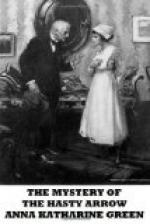“No, Ermentrude.” The words came slowly but firmly. “I put it there myself. I thought it would haunt me less than if left to my imagination.”
Then in a low tone which perhaps reached no other ears than hers:
“I do not know what it does to me; or what I see in it. Something besides youth and beauty. Something——”
“Hush!” She had him by the arm. “Forget it; these men are listening——”
But with a convulsive movement, he broke from her hold, and in so doing his eyes fell on a mirror confronting him from the opposite side of the room. Two faces were visible in it, his own and that of his young victim pictured in the print hanging on the wall behind him. They seemed alive. Both of them seemed alive, and as he saw them thus in conjunction, the sweet, pure countenance of the child he had instinctively mourned, peering at him over his guilty shoulder—the sweat started on his forehead and he uttered a great cry. Then he stood still, swaying from side to side, the eyes starting from his head in a horror transcending all that had gone before.
“Take him away!” she cried. “Out of the room! Let him remain anywhere but here. I pray you; I entreat.”
But he was not to be moved.
“Ermentrude,” he whispered; “they say her name was Duclos. She gave her name as Willetts. What was her name? You know the truth and can tell me.”
XXXIII
AGAIN THE CUCKOO-CLOCK
Then to the wonder and admiration of all, this extraordinary woman showed her full strength and the inexhaustible power she possessed over her own emotions. With a smile piteous in its triumph over a suffering the depths of which they were just beginning to sound, she held his gaze in hers and quietly said:
“You have driven me to the wall, Carleton. If I answer, nothing remains to us of hope or honor; nothing upon which to stay our souls but a consciousness of truth. Shall we let all go and meet our fate as people should who stand on a desolate shore and see the whole world roll away from before them?”
"What was her name?"
At his look, at this repetition of his question, she straightened up, and addressed herself to Mr. Gryce.
“You were astonished and regarded me curiously when at the sound of that foolish little clock I entered this room. That little clock means everything to me, gentlemen.” Here she surveyed them one after the other with her proud and candid eye. “It is the one witness I have—is it not, Carleton?” she asked, turning quickly upon him. “You have not failed me in this?”
He shook his head.
“A witness to what I am still ready to ignore, if such is your will, Carleton.”
Terror! terror far beyond anything they had seen in him yet, paled his cheek and made his face almost unrecognizable; but he could still speak, and in the murmur he let fall she heard no word of protest.




